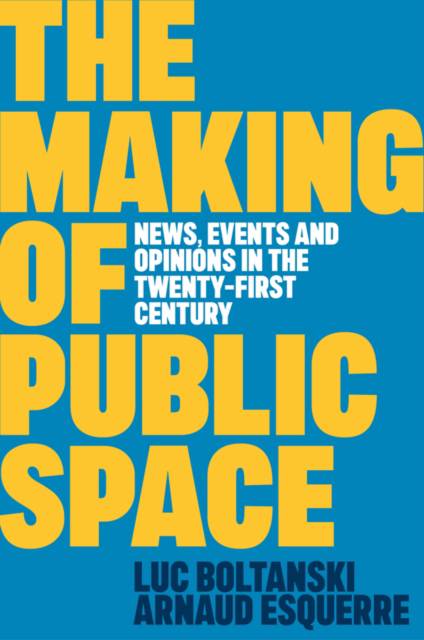
- Retrait gratuit dans votre magasin Club
- 7.000.000 titres dans notre catalogue
- Payer en toute sécurité
- Toujours un magasin près de chez vous
- Retrait gratuit dans votre magasin Club
- 7.000.0000 titres dans notre catalogue
- Payer en toute sécurité
- Toujours un magasin près de chez vous
The Making of Public Space
News, Events and Opinions in the Twenty-First Century
Luc Boltanski, Arnaud EsquerreDescription
This new book by Luc Boltanski and Arnaud Esquerre is a highly original analysis of the two key processes that shape the contemporary public sphere. On the one hand, there are the processes of news provision which select out a range of facts and events and bring them to the attention of a large number of people who have not, for the most part, experienced them directly. On the other hand, there are processes of politicization which problematize the facts made known by news provision and treat them as issues that concern citizens and the state. Politicization is typically characterized by a diversity of interpretations which, in turn, gives rise to a proliferation of commentary, discussion, polemic and division.
In order to study these processes and their interaction, Boltanski and Esquerre draw on a vast repository of user comments left on the site of a major daily newspaper, as well as the thousands of comments posted on an online video site. They uncover what is sayable by comparing published comments with those deleted by moderators. They capture opinions in the course of their formation, rather than describing views which have long become cemented; these are often reflexive and wise, deriving from responses to interviews or opinion polls. They map out the parameters of politicization today, touching on various hot topics such as feminism, the environment, immigration, religion, nationalism and Europe.
This is not just a book about the news and the press, but a major new work which shows how political opinion comes into being and the way in which it affects our daily lives. It will be of great value to students and scholars in media studies, sociology and politics, as well as to anyone interested in the state of politics and the media in our contemporary digital age.
Spécifications
Parties prenantes
- Auteur(s) :
- Editeur:
Contenu
- Nombre de pages :
- 304
- Langue:
- Anglais
Caractéristiques
- EAN:
- 9781509562770
- Date de parution :
- 11-02-25
- Format:
- Livre relié
- Format numérique:
- Genaaid
- Dimensions :
- 152 mm x 231 mm
- Poids :
- 517 g

Les avis
Nous publions uniquement les avis qui respectent les conditions requises. Consultez nos conditions pour les avis.






